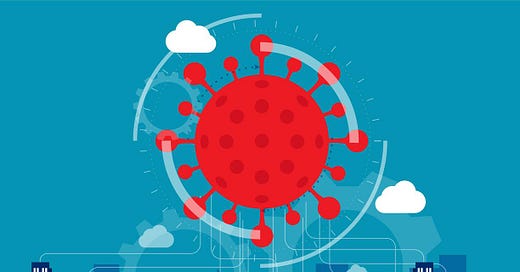Things Change .... or Do They?
Dear readers,
I write this newsletter once every month or so. It features my reflections on the deployment of creativity to making the world’s economic systems (and by extension social and to some extent political systems) more inclusive and, therefore, fairer. That sounds like a tall order – and it is!
If you would like to get the updates directly in your inbox, do subscribe!
I’m reflecting on the last six months. It’s the end of a semester at Harvard. Have things really changed with the seemingly unending assault of the pandemic?
Well .. read on.
On the one hand, it would be hard to argue that they haven’t. We’re constantly scanning virus mutations and vaccinations and recording our status and monitoring where we collectively stand. We’re learning to coexist with those with risk tolerances that differ from our own, in whichever direction. We know that the complexity of logistical tasks has increased (going to the grocery store, navigating airports and malls, and so on), and we see the macro implications – stressed supply chains resulting in scarcity, greater expense and ultimately inflation.
In our workplaces, hybrid work appears here to stay. Many love working without commuting. Who can blame the average office-denizen. In America, not community saves an hour a day on average, probably much more elsewhere. But others decry the loss of community and connectivity, craving in-person debate, discussion and repartee. The evolving Solomonic arrangements all appear to center on some kind of hybrid structure of partial work-from-home. In a just-concluded, formal statistical (randomized) study with a large South Asian organization – employing over a hundred thousand workers – we found that indeed this hybrid work was not just preferred but caused – in a statistical inference sense – better productivity and happier workers and managers. (This study was done with colleagues at Harvard, MIT and Arizona State/)
And yet ... and yet.
I think about the two courses I just finished teaching both dealing with creative problem solving for economic and social development. I taught one to a class of HBS MBAs and engineering graduate students, and another to a mixture of undergraduates and very diverse graduate students – so-called sophomores to surgeons. Our classes were in-person, though fully masked (me, the instructor, and all my students).
In both classes, masks notwithstanding, the fundamental underlying behaviors didn’t seem different to me from decades past. Start with the pedestrian. People sit in the same seat each time. This might seem innocuous but I think it is a spatial signature of how individuals relate to others (their classmates) in a physical setting. The fraction of those who come prepared to class hasn’t perceptibly changed -these range from the very serious to those along for the ride. I did not lighten the academic load on the students, and they did not opine on this one way or the other. The assignments they returned for the courses were on average of quality similar to that of the past. And so on.
So what to make of this? I think back to the horrific event of 9/11 in 2001, which I still vividly recall. The world was shaken. Our daily routines changed. For someone like me, who traveled incessantly as part of my professional life, post 9/11 existence compared to its precursor was like chalk and cheese. And societal changes transcended just travel; ambient insecurity was heightened in so many ways. Yet, we adapted. And the constraints which would have seemed odd if described before that tragedy seem just par for the course now.
Perhaps the same will happen with SARS-COV2 and its various mutations. We will adapt. I don’t mean to say that there’s no long-run cost to this. For one, the zoonosis we’ve just witnessed is likely the result of humans encroaching inexorably on animal habitats. And researchers tell us that this is the first of possibly many more. So, by ‘adapt’ I don’t mean to diminish the importance of addressing this warning more systemically. But I do mean to share my faith in the resilience of the human spirit. But then, I’m always a glass half-full kind of guy.
Do you agree that SARS COV-2 has changed some observable practices but left underlying human behaviors relatively unchanged?
Agree? Disagree? (Vote here)
What’s the most fundamental behavioral change you’ve seen in your circles? (Share in the comments below)



